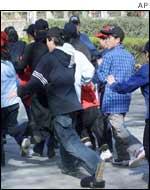Will U.S. Finally Let in N.K. Refugees?
 It’s long past time we did this.
It’s long past time we did this.
The U.S. government plans to break with long-established policy and start giving asylum to refugees from North Korea. Wording in the 2004 North Korean Human Rights Act that allows it to admit defectors from the Stalinist country has not yet been put into practice due to failure to confirm identities and objections from countries where the refugees were staying.
Prominent activists for human rights in the North – Suzanne Scholte, Jae Ku, and Adrian Hong, to name three – were becoming increasingly vocal about their disillusionment with the State Department and Lefkowitz’s failure, thus far, to get the North Korean Human Rights Act implemented. What we have seen recently is a new outreach effort by the State Department, which is the result of those concerns being relayed to Congress (via a knowledgeable source, Reps. Frank Wolf, James Leach, and Chris Smith were particularly instrumental; Rep. Henry Hyde may also have helped).
Jay Lefkowitz, the U.S. special envoy on North Korean Human rights, admitted to the activist group Freedom House in a closed-door meeting that the refugees are becoming a credibility problem for Washington. He also reportedly promised to become more active on the issue. In the meeting, which was attended 20 U.S. campaigners for North Korean human rights, Levkowitz [sic] said he would focus on rights, the issue of refugees and promoting greater openness in North Korea.
After this meeting, which I did not attend but from which I was sent some notes, I heard that this move was coming, although I was asked not to blog it and was fairly skeptical in any event. I still am. Read this closely:
On Thursday, U.S. Secretary of State Condoleezza Rice also implied a policy shift by saying, “We are reviewing our policies on refugese,[sic] reviewing them with DHS (Department of Homeland Security), reviewing them with the FBI, to see if we can find a way to participate in the refugee activities as well. If it does admit them, it is likely to exacerbate tensions with North Korea in an already chilly climate because of Washington’s sanctions and the North’s nuclear ambitions.
For the record, the objections about North Korean infiltration are serious. Put nothing past this regime. But those problems are not insoluble, and must not be allowed to interfere with our higher obligations under federal statute and international treaty. A close reading, in fact, does not completely persuade me that this change has yet made its way to the embassy gates.
For background, see this post by Richardson as well. I must say how great it is to search the new, merged archives and find so many on-topic, well-written posts by my co-bloggers.
Personally, I would be willing to either host a defector (if in a job with less travel), or alternatively be willing to assist at some sort of local center for North Koreans in the U.S. I am sure that religious organizations here – especially Korean – would practically fall over themselves fighting to assist with such projects.
There are of course some logistically problems, but again, lots of volunteers to help, I think. Vershbow addressed this in an interview with OhMyNews a few days ago.
Finally.
It will be interesting to see if North Korean defectors will have an easier time integrating in the United States compared to South Korea where they are treated like second class citizens.
In some ways, they might. There are parts of ethnic Korea-ville in the U.S. that are far more traditionally Korean than in South Korea.
It’s about time the States takes in some NK refugees. Although admittedly fraught with complexity, it’s an issue that needs more than token lip support.